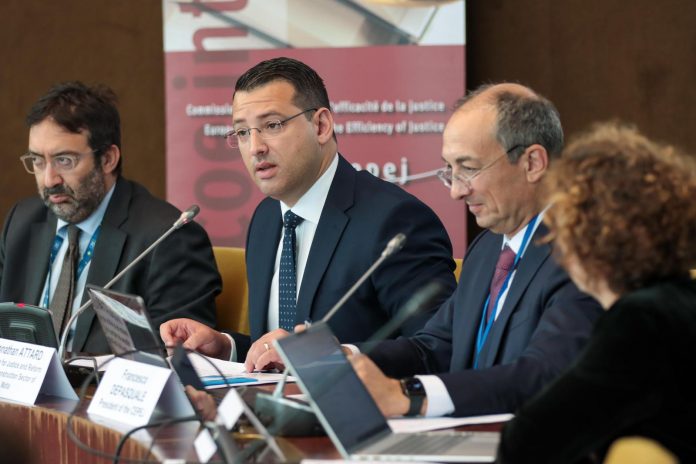Minister for Justice and Reform of the Construction Sector Jonathan Attard officially signed the ratification of the First Additional Protocol to the Council of Europe Convention on Cybercrime, which criminalises acts of a racist and xenophobic nature committed through computer systems.
The ratification ceremony was held at the Palais de l’Europe in Strasbourg, in the presence of the Secretary General of the Council of Europe, Alain Berset. This marks a significant milestone in Malta’s continued commitment to justice, human rights, and the safeguarding of the digital sphere.
Following the signing, Minister Jonathan Attard met bilaterally with the Secretary General and underlined that Malta’s ratification of the Protocol reflects a firm resolve to confront cybercrime in all its forms, particularly where it intersects with hate speech and discrimination. He reaffirmed Malta’s belief in multilateralism and emphasised the importance of unity among nations in upholding the fundamental values of justice and digital dignity.
The signing took place on the margins of the Octopus Conference on Cybercrime 2025, held during Malta’s Presidency of the Committee of Ministers of the Council of Europe. In his opening address, the minister underscored Malta’s active leadership in promoting international collaboration to tackle the evolving threats posed by cybercrime.
“Cybercrime is no longer a peripheral issue—it is a central, growing, and global threat,” noted Minister Jonathan Attar. He also highlighted that Malta is currently advancing legislation to criminalise cyberstalking and cyberbullying, with a bill now at second reading stage in Parliament. The proposed law introduces clearer legal definitions, enhanced protection for vulnerable individuals, and stronger sanctions for offenders.
The minister also outlined national efforts to combat emerging cyber threats, including the misuse of deepfake technology, identity theft, and business email compromise (commonly known as CEO fraud). He warned that such crimes not only cause economic and reputational harm, but also undermine public trust in digital infrastructure.
Malta is intensifying its collaboration with international law enforcement and judicial institutions such as INTERPOL, Europol, and Eurojust, while actively participating in secure information-sharing platforms like SIENA. National laws are being harmonised with EU directives and Council of Europe instruments to ensure legal consistency and agility in addressing cyber threats.
He also acknowledged the crucial contribution of national institutions such as the Malta Information Technology Agency (MITA), which runs the National Emergency Response Team (CERT), Cybercrime Unit within the Malta Police Force, and the National Cybersecurity Coordination Centre (CNCC).
Later in the day, the minister addressed the Plenary Session of the European Commission for the Efficiency of Justice (CEPEJ), where he praised Malta’s long-standing partnership with the institution. He commended the active involvement of Mr Justice Francesco Depasquale, Malta’s representative and current President of CEPEJ, noting that his leadership is a testament to Malta’s dedication to justice reform and international cooperation.
The minister highlighted various joint projects with CEPEJ, including initiatives in judicial reform, digital court modernisation, and the development of and the development of strategies in the offices of the Attorney General and the State Attorney. These collaborations reflect Malta’s forward-looking approach to building an effective, accessible, and modern justice system aligned with European standards.
Present for these events were the Permanent Secretary at the Ministry for Justice and Reform of the Construction Sector Johan Galea and the Permanent Representative of Malta to the Council of Europe, Ambassador Francesca Camilleri Vettiger.
Photo: MJR
![]()








